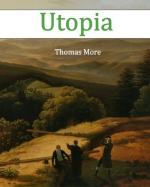|
|
Utopia Major Characters
Thomas More: Author and main character of the book. He sees his friend, Peter Giles, while traveling, and is introduced to Raphael Hythloday, who describes Utopia. His interest in government and travel lead to a debate with Raphael and the description of Utopia, on which the book is based.
Peter Giles: More's friend, whom More sees in the Low countries, and who introduces More to Raphael.
Raphael Hythloday: A well-traveled friend of Giles', who does not believe in the present system of government, but rather in that of Utopia, which he thinks is the only true commonwealth. He lived in Utopia for five years, and describes every aspect of it to Giles and More. The book is based on this description.
Minor Characters
Cardinal Morton: A Cardinal whom Raphael once visited, and whose counselors agree with his opinions, whatever they may be. The Cardinal saw some wisdom in Raphael's remarks. The account of the meeting at the Cardinal's house showed how counselors applaud whatever their superiors want, and how Raphael's advice would be of no use to the king, and therefore Raphael should not become a counselor to the king.
Macarians: Neighbors of the Utopians. Their ruler is never to have more than one thousand pounds in gold, or the equivalent. In this manner, the king focuses on the wealth of the country, and not his own. Raphael recommends this to other governments.
Prince: The ruler of Utopia. Elected by the magistrates, he rules for life. His son does not take his position when he dies; instead, a new Prince is elected.
Philarch: Elected every year, these are the magistrates ruling over every thirty 'families'.
Archphilarch: Elected every year, Archphilarchs rule over ten Philarchs.
Anemolians: One of Utopia's neighboring people. They have clashing customs with Utopia. When their ambassadors came to Utopia, they wore a lot of gold and treasures, as they had heard the Utopians were poor and had little material wealth, and they wanted to show off. As a result, they were laughed at, as gold and treasures are children's toys in Utopia and are of absolutely no value. After staying a while in Utopia, they realized how foolish they looked.
Zapolets: A savage people, whom the Utopians typically hire as warriors, as they prefer hiring warriors to having their own people fight. They are hunters, and love to fight. Therefore, the Utopians do not feel guilty about hiring them, as they fight voluntarily. However, the Zapolets are fickle--they will change sides for an extra penny a day, and will fight against family members for money. The Utopians feel that the world will not miss dead Zapolets, that it will in fact be a happier place without them.
Utopus: The founder, and first ruler, of Utopia. A very wise man who ordered Utopia to be separated from the rest of the continent by a channel, as he felt that Utopians were superior to the rest of the people. Also, he made many laws, including one that states that all Utopians must believe in a Divine Being, but that they may practice whichever religion they choose.
Mithras: Utopian's name for the Divine Being, whom they all believe in.
Brutheskas: What Utopia's priests are known as. There are two types of priests: those that do not marry and believe that they should not engage in any pleasure; and those that marry and enjoy life to the point that it does not interfere with their labor. There are few priests, so that priesthood may remain a highly dignified position, and also because it is difficult to find people good enough to be priests.




